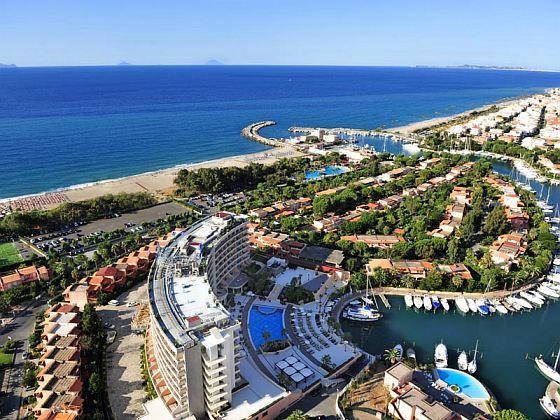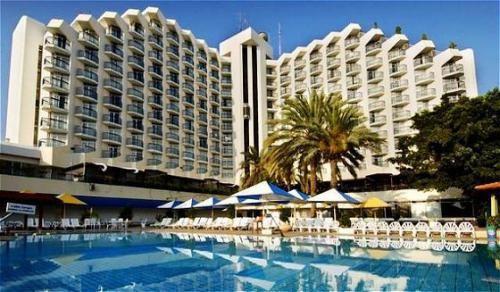by Buzzy Gordon
In the 21st century, the good news for Jewish tradition is that the multi-generational seder still appears to be as much in vogue as ever. Only it is as likely to take place in a hotel or a resort as it is in a patriarch's home. And these specialized Passover destinations are using every lure in the book (although not the Hagaddah) to attract holiday-goers: from tropical cruises to eco-tourism, and gourmet glatt kosher food to exotic adventures in the Far East."For many observant Jews, the attraction of leaving home is two-fold: getting away from the drudgery of Pesah cleaning, as well as traveling to a fun, friendly place where food, intellectual stimulation and even physical activity are plentiful and appealing," says Raphi Bloom, founder and CEO of totallyjewishtravel.com (TJT). a popular US-based website with headquarters in the UK, and publisher of Jewish.Travel (JT), which has stringers in Israel as well. "The week of Passover is the now the busiest time of year for Jews to emulate our ancestors and pack up for a trip."
.
Bloom has been tracking trends in Passover travel ever since launching his site back in 2001 (as the successor to Jewishroutes.com, founded in 1999). This year, more than 120 hotels are advertising on TJT and JT, representing destinations located around the world.
Moreover, according to Bloom, more than 90 Passover tour operators advertised with TJT this year. (Editor’s note: For a list of breakdown by continent, seewww.TotallyJewishTravel.com.)
“What we have found interesting is the expansion of French Pesach operators,” he says. “Many of those who have traditionally marketed themselves to the native French market -- there are some 60 French Pesach operators -- have become more interested in the English-speaking Jewish market. With the help of ‘Google translate,’ the companies advertising with TJT.are now reaching new audiences!”
Economically, this translates also into big business. “We have been witnessing consistent growth in Passover travel every year,” adds Bloom. "Although there is kosher travel all year-round, there are tour operators who do virtually all of their business at Pesah."
Although no-one officially tracks Passover travel numbers, Bloom estimates that approximately 125,000 Jews book hotel and resort rooms for the holiday week. The largest geographical concentrations of hotels are in the United States, Israel and southern Europe (Italy, the French Riviera, Spain and Greece).
"Tour operators keep coming up with different destinations to keep trips interesting,” Bloom says. “In Italy, last year’s Sardinia has made way for this year’s Florence.”
According to Bloom, among the destinations that have resurfaced are South Africa and Hawaii, the latter in a big way: “Last year, the seder was conducted by Chabad in a local synagogue; now it is a full-scale program in-house at the Sheraton Maui.”
Yet another venue has undergone a reincarnation, thanks to the Internet.
“Eastbourne, in England, has traditionally only been marketed in the UK Jewish press,” says Bloom. “This year, in contrast, they advertised with TJT -- and got a huge response from the USA.”
Price is another factor influencing choice of destination.
"In Europe," Bloom notes, "Crete and the Greek islands have become very popular. They are less expensive than the EU countries, Marbella, or the UK."
In the Western Hemisphere, Puerto Rico had long been a leading offshore Passover destination for American Jews; that mantle has now shifted to Mexico -- in luxurious resorts on both the Caribbean and Pacific coasts. The annual Passover cruise in warm waters under the kashrut supervision of Conservative rabbis (most resorts feature Orthodox and ultra-Orthodox hashgaha) often varies its ports of call in the Caribbean and Latin America, to attract repeat customers.
Bloom has detected new trends in the continental United States as well. "Florida, Arizona and warm-weather destinations -- especially this year, when Pesah falls so early in the spring -- are well-established destinations that still have not lost their appeal,” he observes. “However, to appeal to the many Jews in the Northeast who do not wish to travel far, more East Coast resorts -- in Connecticut and Maryland -- are being added to the traditional upstate New York destinations.
“On the other hand,” he notes, “an early Pesah can also attract winter sports enthusiasts: Passover resorts in the Rockies and the Alps are offering skiing holidays.”
"Jews in southern California who want to stay close to home also have new options in Las Vegas and Palm Springs," he adds. "These resorts are especially convenient for Los Angelenos who find it too difficult to take the whole week off work; the family will spend the week at the resort, while the breadwinner shuttles back and forth for the holiday and Sabbath segments." The proximity of shabbat to the seder nights in 5733 makes the short commute even easier this March.
Even not having to fork out for airfare to distant destinations, however, does not mean that Pesah getaways come cheap. Quite the contrary.
“Most resorts converting to ‘kosher for Passover’ are upscale to begin with,” says Lynda Clare, of Presidential Kosher Holidays, a veteran operator of Pesach retreats. “We are proud to feature, for example, two Fairmont resorts -- on the Riviera Maya, and in Scottsdale, Arizona -- both boasting welcoming climates, interesting side trips, and fun recreational pursuits. And prices are all-inclusive, covering meals, snacks, and such on-site activities as spiritual and educational enrichment programs.
“We host families of only two, up to 40, 50 and even 60 family members,” she says. “We get lots of multi-generational families: grandparents, parents and grandchildren—even great-grandchildren. Private seder rooms can be arranged for large families.”
With so many people -- and up to four generations -- involved, there is no longer the homogeneity that once characterized the early days of vacationing families observing Passover at hotels.
“Our guests run the gamut of religious observance,” Clare reports. “Not everyone in the family may be observant, but they enjoy celebrating together.”
Bloom has observed the same phenomenon. “It is not unusual to have a case where the parents are not observant but one of the children is newly religious (ba’al tsehuvah); he or she is the catalyst for everyone having a kosher Passover."
Sometimes, a second generation might split off.
“A recent development we have noticed is an increase in ‘empty nest’ couples,” says Clare. “Yet occasionally smaller family components do not make for diminished Passover crowds: our attendance in Arizona has grown from 250 to 600 in the last five years.”
One big change both Clare and Bloom have noticed is that the Internet, spearheaded by sites like TJT, has led to greater geographical diversity
“Increasingly, family reunions are becoming more and more global,” Clare observes. “Moreover, we have seen lasting friendships formed among families coming from different parts of the globe; they coming together again and again to celebrate Pesah.
“This is not our core business, Clare smiles, “but once in a while a romance develops.”
The Holy Land: Back on the Passover Map
"Israel is buzzing this year," says TJT’s Raphi Bloom. “Even while the Pesah market in the US and Europe has picked up, Eretz Yisrael is as busy as ever.”
Indeed, after years of slumping Jewish tourism because of fears of terrorist violence, Israel is once again in the vacation picture, especially during the pilgrimage holidays of Passover and Sukkot.
One of the leading Pesah program organizers in Israel is Joey Freudmann, a veteran of with more than 25 year’s experience operating in the Holy Land.
“Together with Lenny Davidman of LD events, my company, Ophir Tours, offers some of the most exclusive programs in Israel,“ Freudmann says. “For example, 2013 is our 19th year at the Dead Sea -- this spring at the Daniel Hotel & Spa, where we host the only 5-star, English-speaking Pesah program at the Dead Sea.
“One of the challenges of operating at the Dead Sea,” Freudmann notes, “is that there is very little to do outside of the resort, without traveling a far distance away. The fact that we continue to do well here is a testament to the quality of our educational and enrichment programs.
“Most of our guests are drawn from the English-speaking Jewish community in Israel,” he adds. “However, they are increasingly being joined by family members from abroad, forming some very large groups.”
As usual, Freudmann and Davidman are running three programs this year: at the Sharon Hotel at Herzliya Pituah beach, and at the Crowne Plaza Tel Aviv, in the heart of the action along the Big Orange’s bustling boardwalk.
“All of our programs sell out each year,” says Freudmann proudly. Herzliya has a lovely beach that is quite popular -- although, this year, with Pesah falling March rather than April, the warmer climate at the Dead Sea should be a major draw.”
If there is any lament Freudmann has, it is with regards to the Pesah airfares charged by all the airlines flying to Israel for the holiday -- and not just El Al. “Israel is going to price itself out the market,” he warns. “Clients who used to think nothing about flying a family of 20 or 30 are now reassessing: paying the fares for all these passengers can practically double the cost of the trip!”
SIDEBAR
Waiting until the last-minute to book
Most resorts will offer last-minute deals if space is available close to the holidays. If you are very flexible as to your destination, then you might be be willing to wait as long as you are comfortable before booking.
Keep in mind, however, that the earlier you book your flight, the better deal you will probably get on airfare. Transportation, of course, should always be factored in when comparing Passover options.
The other drawback: the risk that the hotel you want will already be sold out.
“We have Passover operators who stop advertising two months before the holiday,” says TJT’s Bloom, “as soon as their properties are fully booked.
According to Bloom, “There are more budget programs around for the price-conscious; whilst still not cheap by normal vacation standards, they are quite a bit cheaper than the top-end hotels.”
Still, as all observers of the Passover vacation scene have observed, Pesah is the time of year when families are prepared to splurge.
“There are always people on the lookout for a bargain, especially late in the game,” notes Freudmann, of Ophir and LD Events. “I always try to give my customers the very best price I can -- but rarely can this result in a savings of more than 10%.”





